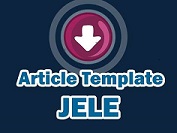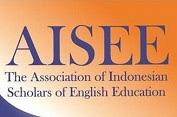Dynamic Assessment in the Writing for Academic Contexts Course
DOI:
https://doi.org/10.36706/jele.v11i1.36Keywords:
dynamic assessment, chronological order, cause and effect, comparison and contrastAbstract
Dynamic assessment as one kind of interactive assessment in education is used to identify student’s skills and potential. This study explored the use of dynamic assessment (DA) in assessing writing skills within the context of the Writing for Academic Contexts course and aimed to measure the impact of feedback on students' writing skills. This quantitative study was conducted at the English Language Education Study Program, Faculty of Language and Arts, Yogyakarta State University, involving 40 students. The data were students’ writing scores before and after the provision of feedback, collected through tasks of writing various essay types such as comparison and contrast, chronological order, and cause and effect. The data were analyzed using a paired-sample t-test. The results suggest that while feedback can significantly enhance scores in certain essay types, it may not consistently improve writing skills across all contexts. The study underscores the importance of dialogical feedback and mediation in facilitating student understanding and improvement. Overall, the findings highlight the complexity of assessing writing skills and advocate for a dynamic and interactive assessment approach that considers individual student needs, fostering a more comprehensive understanding of their writing abilities.
References
Antón, M. (2003). ‘Dynamic assessment of advanced foreign language learners.’ Paper presented at the American Association of Applied Linguistics, Washington, DC, March.
Antón, M. (2009). Dynamic assessment of advanced language learners. Foreign Language Annals, 42(3), 576–598. http://dx.doi.org/10.1111/j.1944-9720.2009.01030.x
Birembaum, M., Breuer, K., Cascallar, E., Dochy, F., Dori, Y., Ridway, J., Wiesemes, R. & Nickmans, G. (2006): A learning integrated assessment system. Educational Research Review, 1, pp. 61-67
Brindley, G. (2001). Assessment. In Carter, R. & Nunan, D: The Cambridge Guide to Teaching English to Speakers of Other Languages. Cambridge: Cambridge University Press
Brown, H. D. (2004). Language Assessment. White Plains, NY: Pearson Education
Coombe, C. (2010). Assessing foreign/second language writing ability. Education, Business and Society: Contemporary Middle Eastern Issues, 3(3), 178-187. https://doi.org/10.1108/17537981011070091
Davidson, P., & Lloyd, D. (2005). Guidelines for developing a reading test. In Lloyd, D., Davidson, P. & Coombe, C. (Eds.), The fundamentals of language assessment: A practical guide for teachers in the Gulf. Dubai, UAE: TESOL Arabia Publications.
Derakhshan, A. & Kordjazi ,M. (2015). Implications of dynamic assessment in second/foreign language contexts. English Linguistics Research, 4(1). 41-48
Ebadi, S., & Bashir, S. (2021). An exploration into EFL learners’ writing skills via mobile-based dynamic assessment. Education and Information Technologies, 26(2), 1995–2016. https://doi.org/10.1007/s10639-020-10348-4
Ebadi, S., & Rahimi, M. (2019). Mediating EFL learners’ academic writing skills in online dynamic assessment using Google Docs. Computer Assisted Language Learning, 32(5–6), 527–555. https://doi.org/10.1080/09588221.2018.1527362
Flowerdew, J. (2002). Genre in the classroom: A linguistic approach. In A. M. Johns (ed.), Genre in classroom: Multiple perspectives. Marwah: Routledge.
Hale, G., Taylor, C., Bridgeman, B., Carson, J., Kroll, B. & Kanto, R. (1996). A study of writing tasks assigned in academic degree programs. TOEFL Research Report No. 54. Princeton, NJ: Educational Testing Service.
Hyland, K. (2003). Second language writing. Cambridge: Cambridge University Press.
Kafipour, R., & Khoshnood, A. (2023). Effect of feedback through dynamic assessment on EFL field-dependent and field-independent learners’ speaking skill development. Frontiers in Education (Lausanne), 8. https://doi.org/10.3389/feduc.2023.1049680
Kroll, B. & Reid, J. (1995). Designing and assessing effective classroom writing assignments for NES and ESL students. Journal of Second Language Writing 4(1), 17-41
Lantolf, J. P., & Poehner, M. E. (2004). Dynamic assessment of L2 development: bringing the past into the future. Journal of Applied Linguistics, 1(1), 49-72.
Lantolf, J. P., & Poehner, M. E. (2014). Sociocultural theory and the pedagogical imperative in L2 education. New York, NY: Routledge
Lidz, C. S. (2014). Leaning toward a consensus about dynamic assessment: Can we? Do we want to? Journal of Cognitive Education and Psychology, 13, 292–307. doi:10.1891/1945-8959.13.3.292
Mardani, M., & Tavakoli, M. (2011). Beyond reading comprehension: The effect of adding a dynamic assessment component on EFL reading comprehension. Journal of Language Teaching and Research, 2, 688–696.
Masrul, Rasyidah, U., Yuliani, S., Nurmalina, Erliana, S., & Wicaksono, B. H. (2023). The implementation of dynamic assessment in EFL learners’ writing. World Journal of English Language, 13(5), 191-199. https://doi.org/10.5430/wjel.v13n5p191
Moore, T. & Morton, J. (1999). Authenticity in the IELTS academic module writing text. In R. Tulloch (ed.), IELTS research reports. Vol 2. Canberra: IELTS Australia, 64–106.
Poehner, M. E. and Lantolf, J. P. (2010). Vygotsky’s teaching-assessment dialectic and L2 education: the case for dynamic assessment. Mind, Culture, and Activity: An International Journal, 17(4): 312–330.
Rassaei, E. (2023). Implementing mobile-mediated dynamic assessment for teaching request forms to EFL learners. Computer Assisted Language Learning, 36(3), 257–287. https://doi.org/10.1080/09588221.2021.1912105
Sardarianpour, S.& Kolahi, S. (2021). The comparative effect of dynamic and negotiated assessment on EFL learners’ writing complexity and fluency. Advances in Language and Literary Studies, 12 (2), 1-12
Shrestha, P., & Coffin, C. (2012). Dynamic Assessment, Tutor Mediation and Academic Writing Development. Retrieved from https://www.researchgate.net/publication/257483774_Dynamic_assessment_tutor_mediation_and_academic_writing_development
Weigle, S. C. (2002). Assessing Writing. Cambridge: Cambridge University Press.
Xiaoxiao, L., & Yan, L. (2010). A Case Study of Dynamic Assessment in EFL Process Writing. Chinese Journal of Applied Linguistics (Bimonthly), 33(1), 24–40.
Downloads
Published
Issue
Section
License
Copyright (c) 2024 The Journal of English Literacy Education: The Teaching and Learning of English as A Foreign Language

This work is licensed under a Creative Commons Attribution-ShareAlike 4.0 International License.













